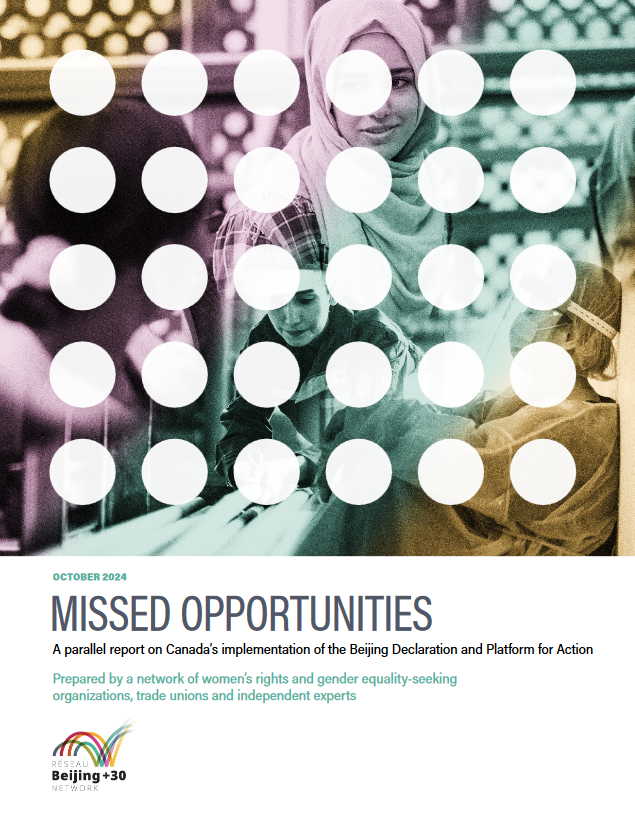The Women’s National Housing and Homelessness Network and 70 allies recently released a report to mark the 30th anniversary of the Fourth World Conference on Women.
 Recently, the Women’s National Housing and Homelessness Network (WNHHN) joined 70 allies, known as the Beijing+30 Network, to release a critical report, Missed Opportunities: A parallel report on Canada’s implementation of the Beijing Declaration and Platform for Action.
Recently, the Women’s National Housing and Homelessness Network (WNHHN) joined 70 allies, known as the Beijing+30 Network, to release a critical report, Missed Opportunities: A parallel report on Canada’s implementation of the Beijing Declaration and Platform for Action.
The Beijing+30 Network is a grassroots network of over 70 feminist and equality-seeking organizations working domestically on women’s rights and gender equality issues in Canada. The organizations within the Network are committed to monitoring the implementation of the Beijing Platform for Action (BPfA) in Canada. The Beijing Platform for Action is a women’s empowerment agenda that was adopted in 1995 at the Fourth World Conference on Women in Beijing. It serves as a blueprint for gender equality and women’s rights that covers topics such as education, health care, and political representation.
This report provides an analysis of the 12 priority areas of concern identified in 1995 as well as additional information on key policy areas that are essential to the realization of women’s rights and gender equality today. It contains sets of recommendations, developed in consultation with chapter authors and Beijing +30 network members, for the accelerated implementation of the Beijing Platform.
One of the 12 areas includes housing, which WNHHN helped co-write. This section includes an overview, new accountability mechanisms, federal policies and programs, and recommendations.
Review the report’s recommendations on housing:
- Ensure gender-based equity in funding under Canada’s Housing Plan and prioritize investments in affordable housing that addresses the deep poverty experienced by women and gender-diverse people. This includes greater investment in the Affordable Housing Fund and Co-operative Housing Program and increasing access to these programs by women-led and women-focused organizations, non-profits and housing providers.
- Develop a robust monitoring system to ensure that funding under Canada’s Housing Plan goes towards the women, girls and gender-diverse people who are in greatest need, and that funding programs are accessible.
- Strengthen income supports to address the depth of poverty experienced by women and gender-diverse people and their families.
- Provide adequate and consistent funding to an Urban, Rural and Northern Indigenous housing strategy that is co-developed with Indigenous communities and applies an intersectional gendered lens.
- Invest in more social housing for low-income households, which are disproportionately women-led, and in more transitional and supportive housing options for women and gender-diverse people experiencing homelessness and fleeing gender-based violence.
- Revise the definition of chronic homelessness in the National Housing Strategy/Canada’s Housing Plan to better reflect gendered experiences of housing needs and homelessness, including hidden homelessness and homelessness among Indigenous women, girls, Two-Spirit and gender-diverse people.
- With a second review panel on Government’s Failure to Eliminate Homelessness for Women and Gender-Diverse People fast approaching, it is critical that shortcomings of the review panel process are recognized and corrected, including the need for government to appear in front of panel members. Identifying systemic violations to the right to housing for women and gender-diverse people would require the review panel to focus on structural challenges like feminization of poverty, multiple forms of gender-based violence, marginalization rooted in racial and ableist discrimination, and harms created through state and colonial institutions.
- Ensure that the development of recently announced new protections for tenants, such as the Tenant Protection Fund and the Renters’ Bill of Rights, is informed by structural barriers faced by women and gender-diverse people, leading to national standards on rent and vacancy control.
Read the full report here.

